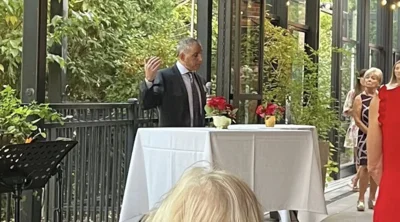Hindsight is 20/20 for Rep. Thomas Morrison (R-Palatine).
After seeing a Commission on Government Forecasting and Accountability slideshow and hearing from Center for Tax and Budget Accountability Executive Director Ralph Martire about Illinois pension forecast during Feb. 20 House Personnel and Pensions Committee hearing regarding amortization and pension buyout plans, Morrison wanted to know what if.
“If Illinois is somewhere in the middle of the road according to your research in terms of percentage of income, the unfunded pension liability that we have at the state and local level that have to be made up somehow, whether it is revenue or borrowing or service cuts potentially, where would (we) be in terms of tax burden as a percentage of income if we had fully funded our state and local pensions over the past decades?” Morrison asked.
Rep. Thomas Morrison (R-Palatine)
A lot wealthier, according to Martire.
“We would be $131.5 billion better off than we are today if we accumulated unfunded liability,” Martire said. “I would have to do a little bit of modeling to see if I could give you an answer.”
What Martire was able to tell Morrison and other committee members was the pension debt is a mathematic matter and not an ideological one to resolve.
“We are only 39 percent funded across all five systems,” Martire said. “We have an unfunded liability in the aggregate north of $131 billion. This is considered problematic since you are not considered healthy at the public-sector level unless you are at least 80 percent funded according to the congressional budget office.”
Morrison said he is concerned as a state resident, then as a lawmaker.
“When people in my area are concerned about the future, they are looking at the unfunded liabilities at the state and local level and they see future tax increases or service cuts,” Morrison said. “Maybe our taxes as a burden have been artificially low in terms of what we are spending at the state and local level, but for the services that people are actually receiving that is what they are willing to pay.”
If it changes, there will be an issue, Morrison said.
“If the amount they are willing to pay exceeds a certain level based upon the services they are getting and they say ‘forget it, I am done with Illinois,’ that’s a problem,” Morrison said.
Martire said Morrison raised a number of interesting points in reflection; however, it’s all a matter of how you see things, according to Martire.
“I think more interesting is that if you look at this pension debt we incurred over the decades in a different way, basically the pension system subsidized the cost of current service delivery over the decades,” Martire said.
For residents to continue to see services they desire, streamline is a must, according to Martire, who said the incurring debt that benefited taxpayers for generations “by keeping their taxes artificially low for the services they were receiving,” is now due.
“The question is how do we structure a way to pay this debt, which we have to pay constitutionally, that mitigates the amount of tax increase we would have to impose to make up for this little bit of a free ride they have had for generations with the pension system subsidizing the services they had,” Martire said. “That’s why we say this is a mathematical issue.”
.jpg)






 Alerts Sign-up
Alerts Sign-up